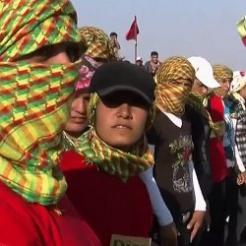A Save the Children report has warned that millions of children in need of assistance in Syria are not receiving it because of a delay in the implementation of aid funding and the lack of a cohesive strategy for aid delivery.
Childhood under fire, released today, also warns that aid is not reaching those with the greatest need due to a lack of Syrian humanitarian organisations willing to be impartial.
Last year funding for Syria fell $130m short of the need identified by the UN, the report says. And while by the end of January 2013 a further $1.5bn was pledged by international donors, the money is not being spent fast enough, said Nick Martlew, author of the report and senior humanitarian advocacy adviser at Save the Children.
"These promises of funding are very welcome, but they need to be urgently translated into real funds for agencies on the ground," he said.
"At the time of writing this report, UN figures showed only 2.9 per cent of the required funding for the emergency education response had been provided, only 2.6 per cent for community services (which includes programmes to improve child protection), and a shortfall of $72m for health – 88 per cent of the requested funds."
The UK has so far provided £139.5m in humanitarian assistance to Syria since the outbreak of conflict. The Department for International Development provides this funding via Save the Children, British Red Cross, Islamic Relief, Oxfam and Unicef. But in February, the Disasters Emergency Committee, an umbrella body for international aid organisations which has refused to launch a dedicated appeal for Syria, said it is not convinced public support for the cause is high enough for its involvement, despite nine out of its 14 organisations already doing so.
However earlier this month International Development Secretary Justine Greening said a rapid response from donors was needed as "Syria's neighbours cannot deal with this alone". Addressing the issue of funding not filtering through quickly enough, she said: “We are working closely with agencies on the ground. Britain has never stood on the sidelines and we are determined to make sure our support gets help to those in need as quickly and effectively as possible," she said.
Save the Children advises international donors to ensure funding is quickly dispersed, flexible, need-based and coordinated to be most effective.
Impartiality is key to reaching those most in need
The report outlines the dangerous conditions aid workers in Syria face, with one of the biggest concerns being security. Some 15 aid workers have lost their lives in Syria in the past two years, it says, and some areas are deemed too risky to operate in. Aid agencies have to negotiate with numerous different factions to reach those in need, the report advises.
"Sometimes more than 20 checkpoints must be negotiated for one journey, with each negotation taking time," said Martlew.
"For Save the Children, humanitarian impartiality is our only passport to repond in Syria," he added.
But partiality among local NGOs means that there are not enough Syrian agencies working in accordance with international humanitarian law, which says that it is a contravention to deny children their right to humanitarian assistance. Local partners can be vital for agencies like Save the Children to implement assistance on a wide scale.
International governments and other donors too are responsible for aid not reaching those who need it most, the report advises, with some funding only whichever groups are on "their side" of the conflict. "The humanitarian imperitive," says Save the Children, "is that the priority for the flow of essential aid to Syria must be to reach those who need it most."
Working together
There is a lack of cohesion in the country for ensuring that the humanitarian community has a clear, impartial national picture of the needs and the response, the report advises, calling for the UN to provide a 'Super humanitarian coordinator'.
Cohesion is made difficult by the threats to security, it acknowledges. To combat this, Save the Children calls for parties to the conflict to provide safe transit for humanitarian response. It also calls for humanitarian agencies to share information with their peers in order to provide a full picture of the need and response, and to help manage security, and calls for humanitarian agencies to work with communities to ensure that key infrastructure such as schools and hospitals are declared 'zones of peace'.
 | Want access to all civilsociety.co.uk content?Subscribers gain access to all expert advice, analysis, surveys, special reports and the full archive of content from as little as £43.20 per year. Find out more... |









